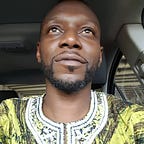In Honor of MLK Day: Thou Shalt Not Terrorize Thy Neighbor
I wanted to share a more optimistic message on MLK Day. But as a Black man who is, at times, afraid to leave my house after dark here in Saginaw, Michigan, due to an unusual number of Confederate flags and presidential signs still hanging on F150s, I just can’t. In these times, I’m remembering that Dr. King called us to pursue love but didn’t shy away from blunt words.
Like many of you, I shook my head in utter disbelief as I watched a violent mob of US citizens break into our cathedral of democracy in an attempt to overturn the recent presidential election. How could they gain entrance to the grounds, be allowed to bust doors and break glass, and steal podiums and lecterns? Fellow US citizens arrived with zip ties and weapons with the intent to cause harm to other innocent human beings — fellow Americans. They built gallows and hung a noose as others chanted for the death of the vice president. The panic buttons in Rep. Ayanna Pressley’s Congressional office were removed without her knowledge, putting her and others in grave danger. And, then, many in the violent mob returned home to resume their lives as police officers, military personnel, pastors, accountants, doctors, local politicians — our neighbors. Many haven’t been arrested or held accountable for their disgraceful actions.
Dr. King’s dream isn’t dead. But his prayers haven’t been answered. 2021 is looking far too much like 1961.
My dad is experiencing eerily similar fears today to the ones he lived as a child in Philadelphia, Mississippi. Philadelphia was often called a bastion of white hate even before Andrew Goodman, James Chaney, and Michael Schwerner were abducted and murdered there in 1964. My dad’s uncle Melvin Kirkland and cousin Ernest Kirkland were very active in Mississippi’s Civil Rights Movement. They held meetings in their home, and Ernest was one of the last people to see Goodman, Chaney, and Schwerner before they went missing. Uncle Melvin would later install a two-way radio system on the top of his house so that Civil Rights workers, trying to register Black voters, could communicate and give warning of possible dangers from the Ku Klux Klan. The KKK regularly terrorized the Kirkland family.
When Reverend King came to Philadelphia in 1966 to participate in the March Against Fear, my grandparents strongly warned my dad, who was 17 years old, against going. The march, which started in Memphis, was often interrupted by counter-protesters. It often turned violent. If you watch this eight-minute video captured by the local news stations, you’ll see a Black protester being run down by a car just before a mob commits additional violence.
According to former Mississippi Secretary of State Dick Molpus, “I heard King tell the townspeople, ‘There is a complete reign of terror here.’ He was standing with a group of people, about 15 people, and he said, ‘This is the worst place I’ve ever been in my life. The killers of those young men are within the sound of my voice.’ And somebody said, ‘You damn right,’ from back about three or four rows.’”
Philadelphia’s violent counter-protesters were police officers, military personnel, pastors, accountants, doctors, and local politicians. Some were my family’s neighbors. This 1966 crowd was just like the violent mob that attempted to interrupt the democratic process and the honored tradition of the transitioning of power. Like the crowd at the US Capitol, they were unashamed.
If Dr. King were alive today, I can imagine that even he — a man of great faith — would be devastated to have to deliver a sermon in 2021 admonishing Americans not to terrorize their neighbors. Unfortunately, that’s where we are today. Let’s all look squarely at that reality rather than pretending otherwise. And then let’s look within to determine what concrete actions we’re brave enough to take in our own lives to bend that arc toward justice.
We’re in this together.
